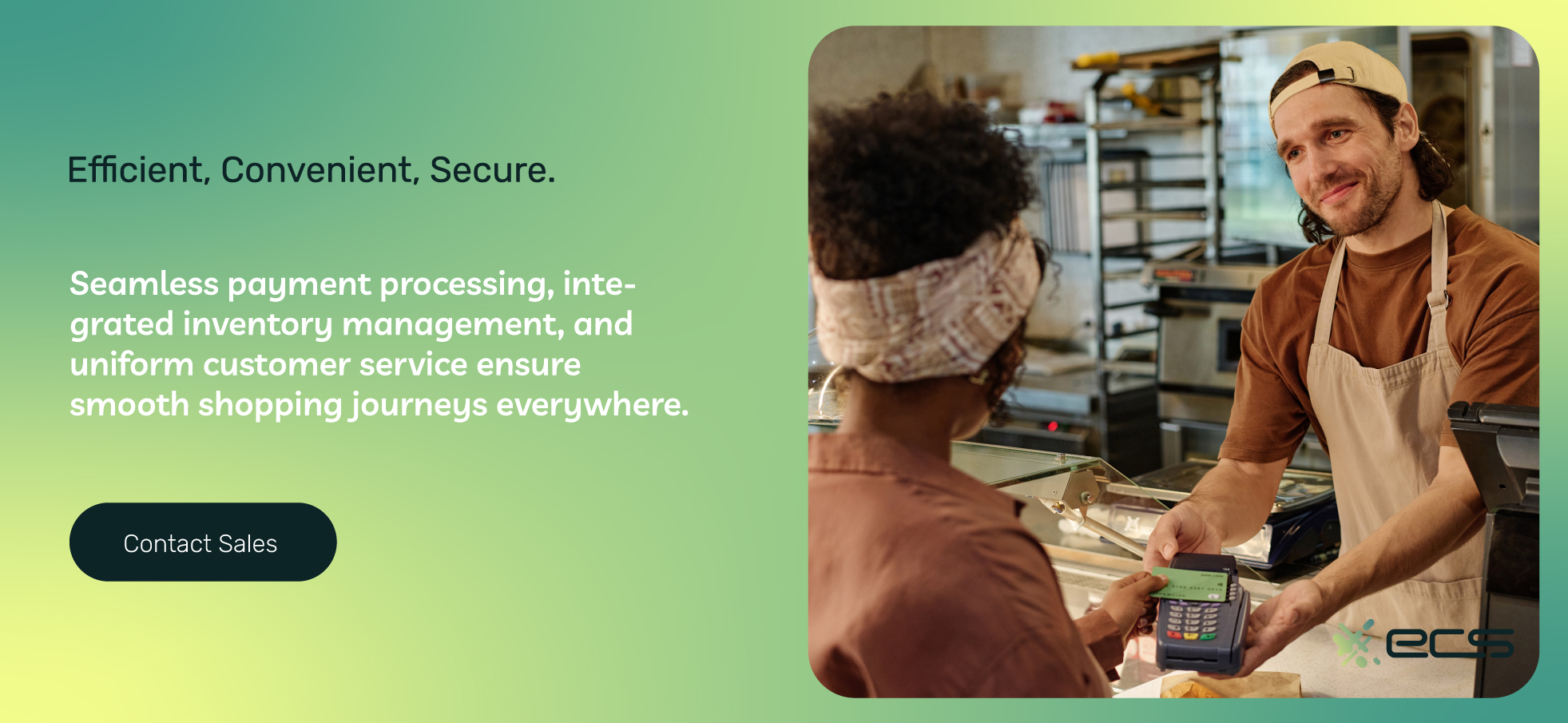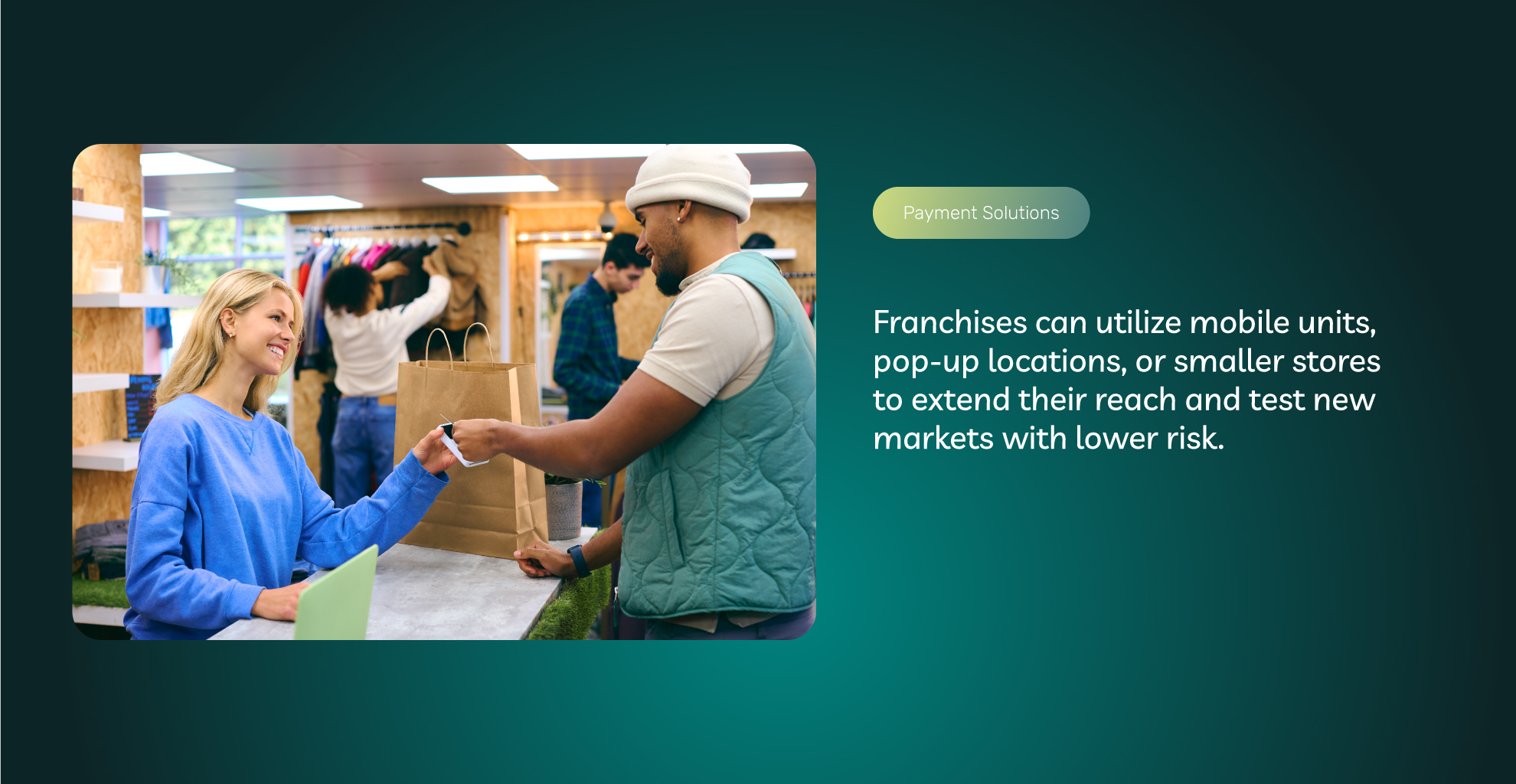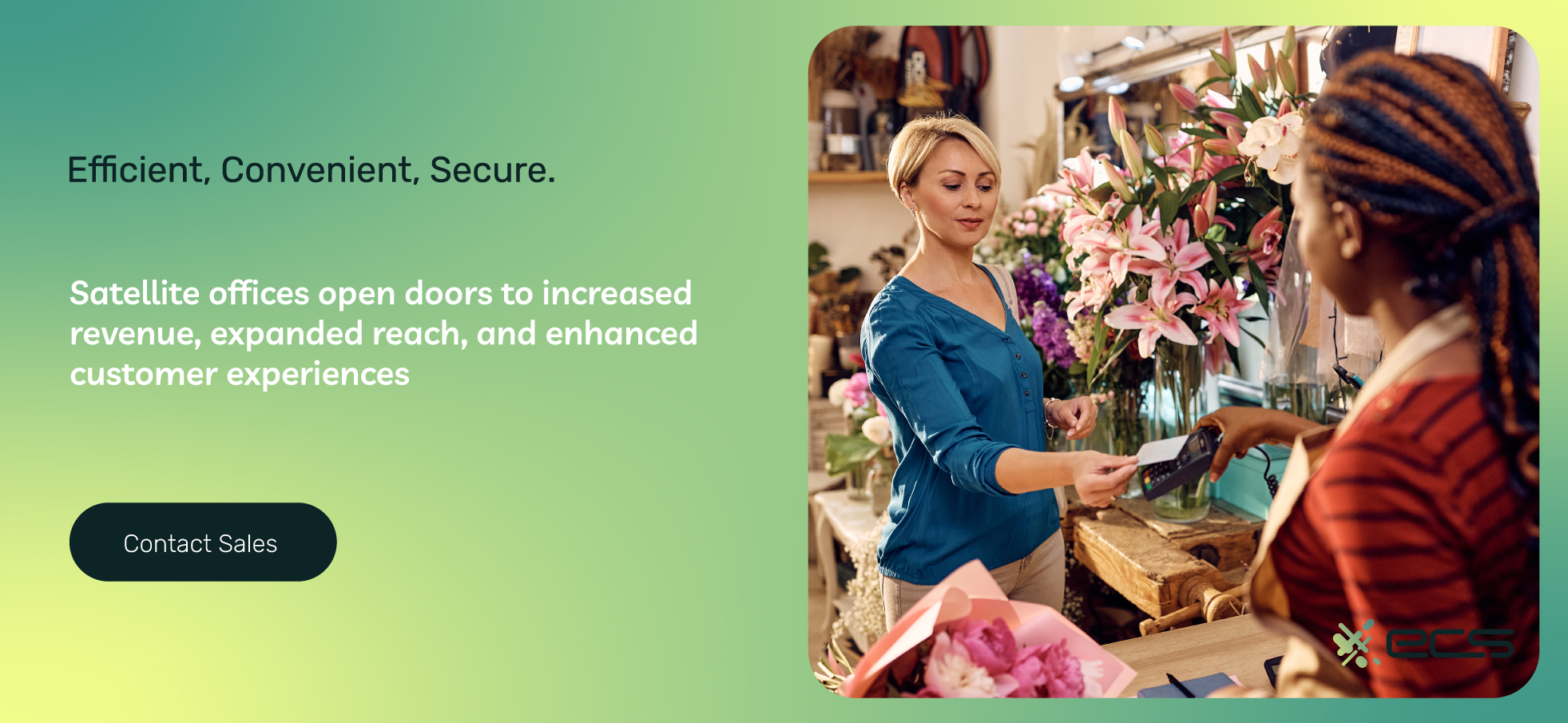A satellite location is a smaller business location apart from the company’s primary footprint. In retail, this might mean a popup booth at a fair. In the food business, this might mean a food truck at the farmer’s market. During the holiday season, this might mean some sort of mall kiosk. And with service-based businesses, this might mean some kind of branch office.
Satellite locations can be temporary (like the aforementioned fairs, markets, and seasonal mall kiosks). They could also be permanent, like a stand within a bigger store, a strip mall retail pad, or even a smaller, standalone location.
Given the opportunity to open additional locations, one might wonder what is the benefit of looking at a “satellite” expansion. Alternatively, what is the benefit of a satellite office for businesses (like service-based businesses) that don’t need to be in more than one place?
What is a Franchise?
A franchise is a business relationship between a corporate franchisor and independent franchisees or owners. The owners pay initial fees and ongoing royalties to sell the products or services of the corporate franchisor.
Many of the businesses you are familiar with are franchises. Just looking at the number of locations, the world’s largest franchises are 7-11 (70,000 locations in 17 countries), Subway (40,000 locations in 100 countries) and McDonald’s (38,000 locations worldwide).
As you can see, many franchises are food establishments. 37% of franchises are food-related, and 25% are specifically fast food. This might be partly because food franchises can build many locations without oversaturating their marketplace. For instance, there are 250 McDonald’s in New York City alone.

Is a Franchise The Same As a Satellite Location?
A satellite location is not necessarily a franchise. Sometimes, a company will open up, supervise, and manage its own satellite location. This hands-on ownership would contrast with a corporation selling the right to use its branding and products to someone else.
Let’s look at an example to explain. Suppose there is a local sandwich restaurant that prepares mouth-watering lunch specialties. Let’s say their restaurant is a large 4,000-square-foot retail pad with commanding water views.
This sandwich shop has decent city-wide brand recognition and is favorably viewed by hungry customers. They decided to open a smaller second location in a mall food court nearby. This is their satellite location.
However, sometimes, a satellite location will be a franchise. Corporations typically refer to non-traditional locations as “satellites.” These smaller locations could be in more flexible workspaces such as an airport, mall food court, university, hospital, gas station, or part of a larger retail setting.
Have you ever gotten coffee at Starbucks and then walked into a Kroger, Giant, Safeway, or Publix—only to be greeted by a mini-Starbucks inside? That’s a satellite location. Sometimes, a franchise owner will have one main business and a satellite.
The satellite may even be mobile, like a food truck. Aunty Anne’s (pretzels), Little Caesars (pizza), and Rita’s Italian Ice (frozen desserts) are all corporations that allow franchise owners to have mobile satellites (e.g., food trucks).
Why Do I Need a Satellite?
If you’re reading this article, there’s a good chance you are already a business owner. Alternatively, you might be thinking of a franchise. We’ll address the idea of opening a satellite office or store location in a separate section. Let’s look at some benefits of opening up a satellite location for your business.
Reason #1: To Increase Your Sales
This is the most apparent reason to open a satellite location for retailers. The adage “you can’t be in two places at the same time” doesn’t apply to a satellite location. You can also make money at the central and satellite locations.
You must ensure there is not too much overlap between the two locations. If a satellite is too close to your principal place of business, you won’t necessarily gain any new customers or additional revenue. Your costs will increase with the new location, but your revenue will stay the same, decreasing profits.
But let’s say the satellite location is sufficiently outside the “sphere of influence” of your home base. You now have an opportunity to earn additional revenue outside of your primary place of business. If the satellite location is smaller than your main establishment, this additional revenue will come at the price of reduced operational overhead.
Satellites and Seasonal Revenue
The revenue benefit of a satellite location is often related to seasonal changes. For instance, a restaurant inside a shopping mall might benefit from opening a satellite kiosk during the holiday season.
There is a significant increase in foot traffic and the amount of time consumers spend in malls come November and December. While the restaurant continues to offer sit-down experiences, the satellite kiosk can sell products (sauces, rubs, other pre-packaged foods) associated with the business.
Another seasonal change is the sports season. Some eating establishments find opening up satellite locations inside a sports arena lucrative. The two most popular fast-food chains inside of sports stadiums are Dippin’ Dots and Papa John’s.
Eight locations around the MLB serve nitrogen-frozen balls of flavored ice (e.g., Dippin’ Dots), and another four around the NBA. Then, there are four different Papa John’s locations around the NFL. Other popular franchise satellites include Tim Hortons in the NHL, Nathan’s Hot Dogs, and Emerald Nuts.
Many satellite locations inside of sporting arenas are regional or local brands. They are capitalizing on brand recognition and consumer loyalty to the “home team.” The sentiment of rooting for the local team translates well to eating locally.
Independent restaurants, craft breweries, ice creameries, and coffee shops can all capitalize on community support to open successful satellite locations in local sporting areas. These food stands are tapping into a profound opportunity. Some stadiums can see as much as $2 million in revenue per game or $30 per fan.
The business can also use the franchise in effective marketing campaigns on the home front. “Come see us at the game!” lets patrons know you support the causes they resonate with (e.g., the home team). This, in turn, builds some loyalty for your own brand.


Reason #2: To Advertise Your Business
This brings us to our next point: satellite locations can provide some natural marketing opportunities. They can become a venue where customers first interact with your business. One situation in which that is readily apparent is airport and train station kiosks.
Customers disembarking from a plane or train usually walk by several businesses on their way to pick up their bags or catch a ride to their hotel. There is a decent chance they will notice the establishments they are walking by.
Retailers and restaurants can put their names out with one of these well-placed kiosks or satellite locations. If your business is in the hospitality sector and capitalizes on out-of-town traffic, an airport satellite location can provide some natural brand introduction.
You might think that this kind of on-the-go branding falls on distracted consumers. Think again! Around 56% of business-related frequent flyers recalled airport ads, and a whopping 49% took some action after seeing such ads. These actions included visiting a website (47%), downloading a smartphone app (36%), and sharing with a colleague (26%).
Satellite Locations and Social Proof
But not all advertising has to be about capturing airport or train traffic. Sometimes, the advertising can be local. Businesses that are not franchise-based cannot capitalize on international recognition. They don’t have golden arches, a mermaid (?) peddling coffee, or the visage of a bowtie-clad Southern Gentlemen.
So these local businesses have to get in touch with new customers somehow. They may try using social media ads, paper mailers, or sponsoring community events. All these things are great ideas as well. However, a well-placed satellite location can expose new customers to the brand. Moreover, if the satellite is busy, this type of marketing taps into the very effective power of social proof.
Social proof is when people see others purchasing or using a product or service. This has always been one of the most vital forms of marketing, and it’s the driving force behind “influencer marketing” on social media. Influencer marketing is when brands pay a popular person to use their product and post it on their social media accounts.
Visual social proof is especially powerful. As many as 62% of customers are more likely to purchase something if they see other people purchasing it. This statistic refers specifically to pictures and videos (like those posted on social media).
In-person social proof (e.g., seeing customers at your satellite location) may be even more potent than digital social proof, which is quickly forgotten between reels of cute cats. The average consumer is bombarded by posts about everything. But, seeing a booming satellite location and having a positive initial brand interaction may turn them into a lifetime customer.
Satellite Locations and Community Branding
One compelling form of social proof is when your satellite location ties into some sense of community. Farmers markets, festivals, and commissaries are a few locations that local businesses should consider planting roots into. This is especially true in the food and beverage sector but can also apply to retailers.
For farmer’s markets and festivals, the satellite location will probably need to be on wheels. Some festivals are dedicated to a particular community, cultural, or social cause. Bringing your mobile satellite location to an event like this can cement a connection in customers’ minds between your business and the causes they care about.
This emotional type of marketing is very similar to the seasonal or sports-related satellite marketing we discussed earlier. Another similar idea is the commissary. Commissaries often refer to commercial kitchens. But sometimes, they refer to a sort of local venue for live music and local eats.
These places often spring up in urban neighborhoods that are being revitalized. Think of Soho in New York, The Pearl in Portland, Oregon, and Charles Village in Baltimore. Commissaries are places to enjoy a local brew, taste the food of an up-and-coming local chef, and catch some live jazz or enjoy an open mic. Placing a satellite in a location like this sends strong trust signals about community involvement while exposing new customers to your brand.
However, note that this marketing strategy is not limited to the food business alone. Other types of retailers can most certainly benefit from fixed social watering holes (like a commissary) or seasonal exhibitions like fairs, festivals, and markets. While it’s hard to classify participation in an annual event as a “satellite,” one could certainly say this adage applies to something weekly, like a farmer’s market, or something seasonal that’s up for a few weeks, like a Christmas fair.
Reason #3: To Bump Into Competitor’s Markets
Another reason to open a satellite location is that it gives you some egress into a competitor’s marketplace. This can be particularly true for local businesses that cannot rely on corporate branding. These businesses often have niche spheres of influence limited to a neighborhood or a few neighborhoods.
Satellite locations at a mall, strip mall, or ongoing festival are an excellent way to expand the business footprint. Establishing a second (or third, or fourth) location in an unproven area can be too much of a risk for businesses with limited capital.
By contrast, a satellite location is a much more affordable way to get the name out there in a new but nearby neighborhood. Community events often have enough space for multiple businesses in the same vertical to be present. For instance, a boutique grocer can have a booth next to all the other boutique grocers in city limits.
Consumers inclined to shop at these places might be exposed to a new option. Some may even switch their ongoing loyalty if the initial experiences are better than what they currently get.

Reason #4: To Reduce Overhead
Satellite locations can also reduce some of your overhead costs. For businesses selling products, the smaller footprint of a satellite location can help pick up some increased foot traffic without the expense of opening a full-scale second location.
Think of some of those sporting event kiosks and stands we mentioned earlier. Now imagine a local brewer with a 4,000-square-foot primary location. Instead of opening a second, similarly-sized location to attract more business, they opened a kiosk at a local stadium. They will not have the same operational overhead (e.g., utilities and property taxes), but they will get exposure to a significant population of consumers interested in their product (sports fans).
Now, what about service-based businesses? They, too, can see significant reductions in overhead by relying on satellite locations. Moving a large number of employees and equipment to a new location can be costly. A satellite location can allow a business to enact the market penetration it wants without the cost of opening a full-scale location equipped with everything for offices.
Another aspect of “overhead” relates to the employee perspective. That is to say, satellite locations can reduce costs for employees by cutting their commutes down. Service-based businesses with a central office can build satellite locations so that some employees can work closer to home.
While this can trim down expenses for consumers, it can also give the business a way of keeping their salaries lower (e.g., not having to compensate for extensive travel time). Establishing a more local presence can also facilitate the popular hybrid work-from-home model, with employees periodically reporting to the satellite location.+
Reason #5: To Capture Specific Talent Pools
For service-based businesses, a satellite location can help capture specific talent pools. The interest in capturing this talent pool might relate to skillsets or labor costs. Many large service-based businesses do this by placing their call centers in locations with lower costs of living. Consider these customer service centers as satellite locations.
Of course, outsourcing customer service overseas is a somewhat contentious issue. Some customers find it frustrating, while others find outsourcing politically disagreeable. But even companies who keep their call centers “stateside” can benefit from “satellite locations.”
Big banks, for instance, do not have their call centers in Manhattan, even though it’s the home of Wall Street. The overhead of having ample office space in Midtown and the salaries they would have to pay are far more significant than a call center in Texas (no offense to Texas).
Another reason service-based businesses open satellite locations is to capture specific types of talent. Some businesses have found that placing satellite locations in certain areas draws within the type of workforce they seek.
For example, a large software company might build a satellite office in a college town, pumping out a lot of business majors. These graduates can become the top talent in the sales cycle at this specific company. The proximity of its office achieves the visibility of the company on campus. It will also be easier to offer summer internships to potential employees.
Reason #6: To Expand the Reach of Your Business
This may seem similar to expanding your footprint into competing spheres, but it is slightly different. In this case, we are talking about setting up a satellite office to expand the reach of your business. Let’s say your business already has an extensive sphere of influence.
However, let’s also say that your business only has one piece of tangible real estate. An example of this type of business would be in the home improvement or maintenance sphere: consider plumbers, electricians, roofers, and contractors. This type of skilled labor may have a wide radius of influence regarding the customer base.
Such a company that is physically in one location may see some impact on its long-term cost efficiency, especially in transportation. The centrally located fleet will have to travel (collectively) a lot of miles to cover all their house calls.
Establishing a satellite office can lower some of the transportation costs. Physically separate locations allow the fleet to cover the same area more efficiently. This could also translate into scheduling more calls, which, of course, means more revenue.
Reason #7: To Improve Your Customer Experience
This one once again relates to service-based businesses. Think of banking branches as satellite offices. This helps the bank establish a presence near its customers. They can go into the bank to ask questions and get help navigating their personal finances. If they want to take their money out, they know they can do that without traveling far and/or hunting for a branch.
Mobile phone companies and cable service providers have leveraged this idea with smaller stores and “orbiting satellites” within big box stores like Target, Walmart, and Best Buy. These places are where customers can interact with service agents in person. The agents can help them with phone questions (how do I download Candy Crush) or upsell products (Candy Crush will be so much better on this larger screen).
This benefit of satellite offices or locations relates both to customer experience and revenue. That’s because (as mentioned) service conversations can lead to upselling. But even if we set aside the revenue-boosting practice of upselling, satellite locations can significantly improve customer retention.
That’s because customers will feel better knowing that if they want to talk to someone in person, they can. They might never even set foot in the satellite location. But just driving down the street and seeing a store or walking through the mall and seeing a kiosk lets them know that help is there if they need it.
Customer experience is essential. As many as 80% of consumers say that the “experience” a business provides is just as important as its products or services. Let’s tie this to the point at hand (satellite locations).
A satellite office is a place where customers can get better quality customer service. The experience these branches provide can reduce churn and improve the overall lifetime value of your customers.

So Is a Satellite Location…A Second Location? Or Third?
All businesses go through different phases. Expansion is one of them. Expanding from a single location to a second and third location is exciting. However, it can also be an expensive time. Sometimes, the cost of expanding can even cause significant financial problems.
This type of overexpansion has happened to even the largest of businesses. Large corporations like Washington Mutual Bank have gone under because they opened too many locations. And while a local business might not have the leverage to expand as aggressively, it can still get into financial trouble.
This is why a satellite location might be a better alternative. It can allow your business to test the proverbial waters of a new market without the all-in commitment. Satellite locations may technically be your business’s second, third, fourth (etc.) location. However, the meaning of the word satellite offices or satellite location implies something smaller.
Think of the moon, orbiting planet Earth. The moon is technically, in astronomical terms, a satellite. That is, it orbits a larger astronomical body. A satellite location is usually smaller in size, scope, or operations than the central place of business.
So, in summary, a satellite location like a mall kiosk, small retail pad in a strip mall, or mobile unit (e.g., food truck) could be a great way to expand your business without the cost of a more “traditional” second location.
Satellite Location Wrap-Up
Satellite offices mean a secondary (often smaller) location from the principal place of business that may offer numerous benefits, even for retail stores.
These locations can increase your revenue stream by providing additional points of sale. They can help advertise your business with the social proof of living customers and expand into competing market spaces. They can reduce overhead, help capture specific talent pools, broaden the reach of your business, and improve customer experience.
Franchises and satellite locations are not necessarily the same thing. That’s because a corporation (or small business) can open up its own directly-managed locations. But sometimes, a satellite will be part of a franchise model. For instance, the franchise owner of a local restaurant may decide to open up a mobile “satellite” unit or a second “satellite” unit at an indoor shopping mall or sports arena.
One challenge with satellite locations is consistent payment processing across all locations. You want payment processing solutions to be uniform for customer experience. But you also want them to uniformly integrate with inventory, accounting, and other software.
If you are looking at opening a satellite location, or you already have one and want to change your payment processing for all business locations, we can help. We would love to get to know your business and discuss specific solutions most appropriate for your industry’s unique needs. Contact us by giving us a call or filling out the contact form below.
Frequently Asked Questions About Satellite Locations
While opening a satellite location can be considered a second or third business location, “satellite” typically implies a minor operation compared to the main business. ECS Payments understands the unique challenges of running multiple locations. We provide tailored payment processing solutions for efficient operations across all locations.
Opening a satellite location can be advantageous in many ways, including increased revenue streams through additional points of sale, new advertising opportunities and brand awareness through new social settings and expansion into new markets, reduced large location overhead costs, and improved customer experience. ECS Payments provides payment processing solutions that seamlessly integrate with inventory, accounting, and other software tools across all business locations.
Satellite locations, including mall kiosks or small retail pads within larger corporate stores, provide customers with better access to services and enhance their overall experience with pure convenience at locations where they may already be shopping.
Franchises and satellite locations are not necessarily the same thing. Satellite locations are smaller parts of a company managed by the company owner. In contrast, franchises involve a partnership between a corporation and independent owners who manage their own places.
